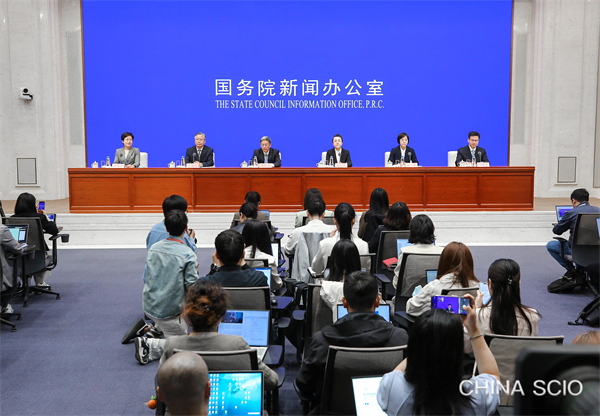China strengthens efforts to boost private economy

On May 8, 2025, the State Council Information Office holds a press conference in Beijing to brief the media about the Private Sector Promotion Law of the People's Republic of China. [Photo by Liu Jian/China SCIO]
Chinese authorities have pledged to introduce measures to implement the country's groundbreaking Private Sector Promotion Law, which takes effect on May 20.
Passed by China's top legislature on April 30, the law is the country's first fundamental law dedicated to the private economy. It comprises nine chapters and 78 articles, covering key areas such as fair competition, investment and financing promotion, scientific and technological innovation, regulatory guidance, service and support, and protection of rights and interests.
This law marks the first time that the legal status of the private economy has been clearly defined, Wang Zhenjiang, vice minister of justice, said at a press conference on Thursday.
"The formulation of this law clearly demonstrates that our Party and the state's fundamental policies regarding private economic development will not change and cannot change." said Wang Ruihe, deputy director of the Legislative Affairs Commission of the Standing Committee of the National People's Congress.
Zheng Bei, vice chairwoman of the National Development and Reform Commission (NDRC), China's top economic planner, noted that the private sector promotion law helps stabilize expectations, boost confidence, and promote high-quality development.
She said that the law actively addresses concerns of the private sector by introducing targeted institutional arrangements. For example, in terms of fair market participation, the law emphasizes that China implements a nationwide unified negative list system for market access, and items that are not on the list are open to all market participants, Zheng said.
Regarding access to production factors, the law mandates that private economic entities have equal access to funds, technology, human resources, data, land and public service resources, she said.
Zheng also noted that the NDRC has already been working to provide support to private businesses in terms of removing access barriers and improving services. For example, private enterprises saw their bid-winning rate climb by 5 percentage points from January to April compared to the same timeframe last year. Private businesses secured over 80% of all contracts for projects valued under 100 million yuan (US$13.84 million).
The NDRC is also working to enhance long-term mechanisms that facilitate private enterprise participation in major national projects, Zheng explained. According to her, the NDRC has launched a series of major projects across sectors such as nuclear power and railways. Currently, private capital holds a 20% stake in certain nuclear power projects, while in areas like industrial equipment renewal and resource recycling and reuse, private enterprises contribute over 80% of the investment, she added.
For private enterprises in key sectors and critical segments, targeted financial services will be in place to support their development, said Cong Lin, vice minister of the National Financial Regulatory Administration (NFRA).
She cited the high-tech and emerging industries as an example, where private enterprises have excelled in recent years. She said the NFRA has been refining its services by promoting both investment and financing, innovating credit-enhancement methods, and supporting the commercialization of scientific and technological achievements.
By the end of the first quarter of 2025, the balance of loans to high-tech enterprises nationwide reached 17.7 trillion yuan, up 20% year on year, according to Cong.

Ministry of Justice of the
People's Republic of China
All rights reserved. Presented by China Daily.
京ICP备13016994号-2


